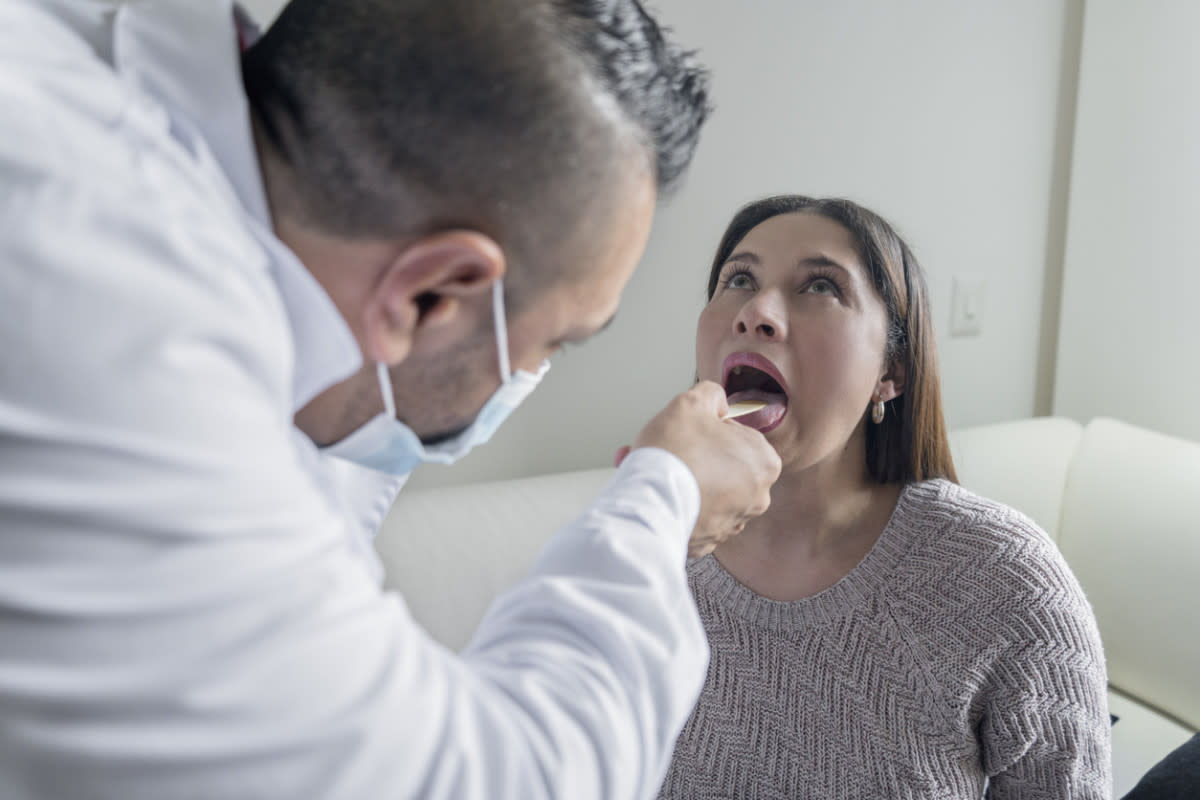'COVID Tongue' Is Definitely a Thing—Here's What It Is and How to Know if You Have It

- Oops!Something went wrong.Please try again later.
In the early days of COVID, it felt like we were learning new things about the virus in real time daily. Its severity, especially for specific populations like older adults and the immunocompromised, and the reality that the virus could cause temporary loss of taste and smell were rather unsettling.
Since then, we've learned a lot about the virus, but staying current on potential signs, symptoms and side effects is still critical.
"We have gone from pandemic COVID to endemic COVID, which means it will be with us for a long time to come," says Dr. Linda Yancey, MD, the director of infection prevention at the Memorial Hermann Health System in Houston. "It is going to be important to understand all the possible presentations of the virus."
One of those presentations is the "COVID tongue," which is not a clinical diagnosis. However, if you experience the sore tongue and throat that COVID-19 can trigger, you're not imagining things. What can you do about COVID tongue symptoms, and are they preventable? Here's what doctors want you to know about COVID tongue sores, the mysterious white coating and how long it'll last.
What Is COVID Tongue?
Clinically, it's known as "glossitis," but it's become known as "COVID tongue" because you might experience it if you catch the virus. "COVID tongue refers to a rare but well-described condition in acute infection where the taste buds are attacked and temporarily damaged by the virus," Dr. Yancey explains.
COVID tongue symptoms vary. Dr. Omid Mehdizadeh, MD, an otolaryngologist (ENT) and laryngologist at Providence Saint John’s Health Center says they might include:
Discomfort
Burning
Swelling
Redness
Change or loss of taste
Ulcers
Plaque-like smooth areas signifying loss of the papillae or taste buds (for the unfamiliar, papillae are the small bumps on your tongue—your taste buds reside inside.)
About the white COVID tongue photos you may see on social media: It's a common symptom of benign glossitis, and you'll likely notice it around the papillae.
Importantly, these symptoms can also pop up because of other issues, so it's important not to assume you have COVID if you notice oral symptoms like sores, says Dr. Thomas Gut, D.O., the associate chair of medicine at Staten Island University Hospital. Dr. Gut explains that other reasons for glossitis include the following:
Other viral infections
Dry mouth
Allergies
What Causes COVID Tongue?
COVID spreads via droplets, and the mouth we use to breathe and eat is one of the virus's favorite "doorways." Dr. Gut says that scientists have theorized that COVID-19 starts to attack the bumps on the tongue (papilla) by using what's known as an angiotensin-converting enzyme receptor (ACE-2). The theory has "been held as a plausible scenario based on the increased presence of ACE2-receptors in areas of the mouth where COVID has been known to affect," Dr. Gut explains.
As a result, COVID tongue symptoms can occur, including inflammation and swelling. The effect it has on taste buds can impact how you enjoy food for a bit.
"COVID tongue may represent loss of taste buds or papillae on the lining of the tongue," Dr. Mehdizadeh says.
Related: The #1 COVID Symptom to Look Out For, According to Infectious Disease Experts
How Common Are COVID Tongue Sores And Other Symptoms?
It's not the most common symptom of the virus. However, people have reported it since COVID-19 became a part of our lives in 2020. For instance, a study of more than 650 people in Spain found that more than a quarter experienced oral issues, including tongue swelling, redness and inflammation.
While that is a significant number, more recent studies found fewer people experience COVID-19 symptoms. One from 2022 put the number at about 15%, while another from 2023 found that 20.5% of people reported signs associated with COVID tongue, like lesions.
Still, the authors of the 2022 research on COVID tongue called for more data because of "the ever-increasing rise in the number of oral infections attributed to the SARS-COV-2 virus."
Can You Treat or Prevent COVID Tongue?
No, and not really. "There is no consensus on formal treatments," Dr. Mehdizadeh says. "Remedies utilized in the literature include multivitamins and minerals, anti-septic oral rinses and antifungals if indicated—perhaps topical steroids if recommended by a provider."
The good news? "This tends to be a temporary issue that resolved on its own," Dr. Yancey says.
The time it takes for COVID tongue symptoms to clear up varies, but Dr. Mehdizadeh puts it in the "days to weeks" range. While the symptom is rare and generally uncomfortable but not life-threatening, Dr. Mehdizadeh advises people to see a doctor if they are experiencing:
Severe pain
Difficulty swallowing
Severe swelling
Problems breathing
The only true way to prevent COVID tongue is to avoid getting COVID in the first place. Dr. Yancey also stresses that vaccination is the best way to avoid severe cases and symptoms of the virus.
Sources
Dr. Linda Yancey, MD, the director of infection prevention at the Memorial Hermann Health System in Houston
Dr. Omid Mehdizadeh, MD, an otolaryngologist (ENT) and laryngologist at Providence Saint John’s Health Center
National Library of Medicine. The National Center for Biotechnology Information. Glossitis.
Dr. Thomas Gut, D.O., the associate chair of medicine at Staten Island University Hospital
Prevalence of mucocutaneous manifestations in 666 patients with COVID‐19 in a field hospital in Spain: oral and palmoplantar findings. BJD.
COVID Tongue. Journal of Indian Society of Periodontology.
Oral Manifestations of COVID-19 Infection: An Analytical Cross-Sectional Study. Journal of Maxillofacial and Oral Surgery.
The oral manifestations and related mechanisms of COVID-19 caused by SARS-CoV-2 infection. Frontiers in Cellular Neuroscience.

